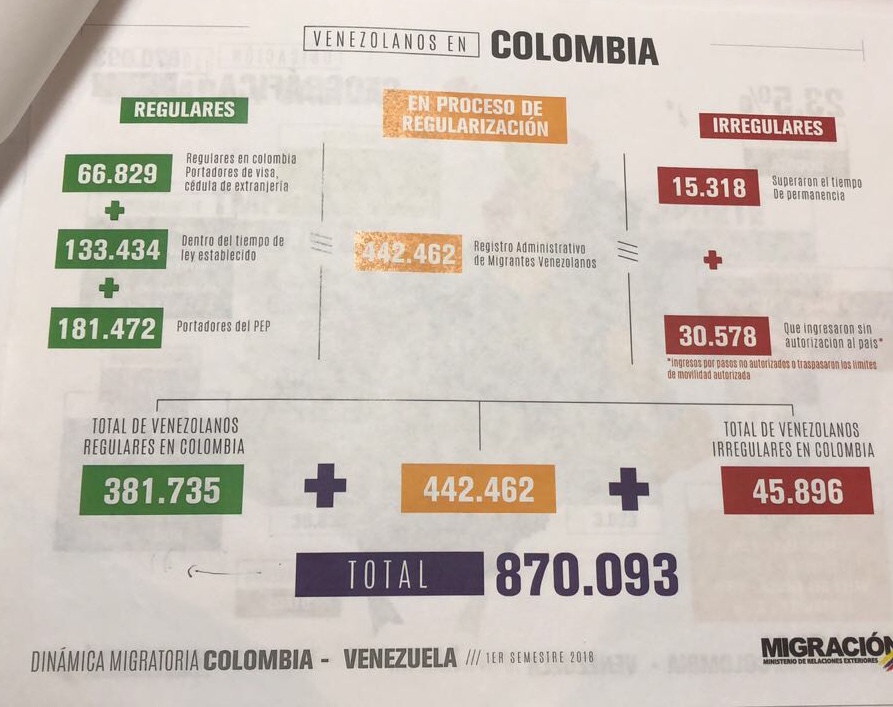Regularization Session Approved by President Santos in Colombia
Starting August 2, 2018, Venezuelans will have rights to health, education and employment in Colombia. With a decree approved by President Santos, around 400 thousand Venezuelans are now regular migrants. Other countries should follow the lead.


Photo: AFP retrieved
1288: That’s the decree number approved on August 2, 2018, by Colombian President Juan Manuel Santos, through which the Permiso Especial de Permanencia (PEP, or Special Permanence Permit) becomes the way to regularize 442,462 Venezuelans who were in the country irregularly, as documented through the recently concluded Registro Administrativo de Migrantes Venezolanos, RAMV (yep, we got our own special registry). The decree also adds protection for Colombians who are coming back to their homeland after years in Venezuela.
Golazo! Way to go, Colombia!
According to Colombian authorities, close to 1 million Venezuelans arrived there in the last 15 months (870,093, to be exact). How did they get this number?
- A group of some 381,735 Venezuelans had already adjusted their status with a visa, a previous version of the PEP or a stamped passport;
- Around 442,462 Venezuelans were irregular and in the process of regularizing their stay, as documented in the RAMV, which took place between April and June this year, in 413 municipalities at the Colombian border and other cities. These are the beneficiaries of Decree 1288;
- Around 45,896 have entered via trochas, or have overextended their allowed stay, and are irregular migrants;
With this decree, the 442,462 Venezuelans in process of regularization can now have access to the PEP, or RAMV-PEP, as it’s being called, which allows them to stay for two years, granting them key rights, like the right to health, education and employment.
This is important, because results of the RAMV painted a worrisome picture of arriving Venezuelans, in at least these three dimensions:
- Around 437,513 (or 98% in the registry) said they weren’t affiliated to any health benefit. This was bad considering their precarious health conditions. The RAMV says that health, along with food scarcity, were the main Venezuelan migration triggers;
- Of the 118,709 children migrants, only 33,107 were registered in Colombian schools. That’s only 27%, when it should be 100%;
- Of those who answered the registry, 3,326 had a formal job, meaning a mere 0.7%; 439,136 had informal, or no jobs. With around 16% of irregular Venezuelans in Colombia having technical or professional studies, the decree opens a range of job opportunities and many potential benefits for the Colombian economy.
But we’re not there yet. The challenge is now implementation: Venezuelans will have to comply with certain requirements to get their RAMV-PEP (like participating in the RAMV and keep the certificate, have no previous arrests or arrest warrants, and have no deportation measures initiated). The price to pay for these rights? None. “No hay que bajarse de la mula para obtener el PEP, solo debe cumplir a juro con los requisitos,” Migración Colombia dixit.
On the Colombian government’s side, there’s more to do. For the next couple of months, and until early October, Migración Colombia will have to receive and process the applications of 442,000 Venezuelans, a few thousand per day. No small feat, but certainly commendable.
Regularization is the first step for a safe, orderly migration process, as proposed by the Global Compact for Migration, guaranteeing the protection of migrants’ human rights. This is something that other countries of the region must follow, and there’s responsibility on these Venezuelans, too. They must be examples of civic duty, fulfill the obligations of residing in Colombia, respect its laws and make sure to contribute positively to the communities they take root in.
A dar la talla, guys.
DISCLAIMER: The views are personal and do not represent the position of the OAS.
Caracas Chronicles is 100% reader-supported.
We’ve been able to hang on for 22 years in one of the craziest media landscapes in the world. We’ve seen different media outlets in Venezuela (and abroad) closing shop, something we’re looking to avoid at all costs. Your collaboration goes a long way in helping us weather the storm.
Donate





